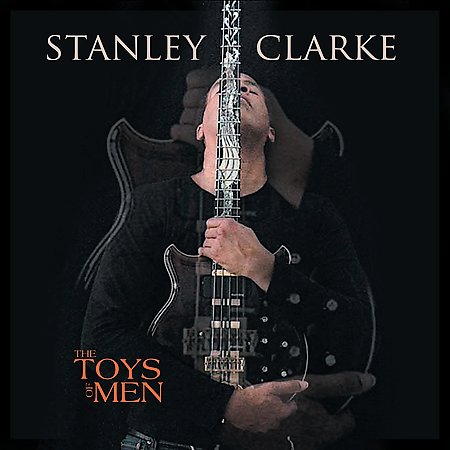

When a bass giant like Stanley Clarke releases a
new album, this is always a special event. Clarke's new album isn't
foremost entertainment but a message.
“If you study history, and the history of
warfare, it boils down to some very simple dynamics,” says Clarke.
“When there are disagreements and disputes between countries, people
always go back to their toys and how they can use them to intimidate
their adversaries. This goes all the way back to the days when we were
fighting each other with swords and shields, and even rocks and clubs.
It’s just a part of human nature, particularly with men. There’s this
basic belief, however flawed as it might be, that the only way you’re
really going to get what you want is by conquering someone or
something. In those moments in history when we’ve been at war or on
the brink of war, the whole idea of just allowing something to be what
it is just doesn’t exist.”
The album starts with a six-part suite recurring
about this theme. The Toys Of Men is parted into the pieces
Draconian, Fear, Chaos, Cosmic Intervention, The Opening Of The Gates
and God Light.
“When you listen to the song in all of
its parts, it has a lot of different emotions going on in it,” Clarke
explains. “There’s fear, there’s confusion, there’s chaos, all of
those things that we associate with war and destruction. But at the
end, in those segments entitled ‘The Opening of the Gates’ and ‘God
Light,’ there’s ultimately hope.”
This suite has a certain similarity to Mussorki's
Pictures of an Exhibition, especially performed by Emerson, Lake
and Palmer in the 80's. One also finds identity with Pat Metheny's music
(The Way Up).
Dominant factor of this suite is Clarke's bass appearing in its
electric and acoustic form. Clarke has a vivid affinity for the
violin, here performed by Mads Tolling. As a soloist, he regularly
tours as jazz violinist with Stanley Clarke and his touring band. He
is also the newest member of the Grammy Award-winning Turtle Island
String Quartet.
The short Come On underlines Clarke's
inimitable slap bass technique and dexterity. Mads Tolling's violin
paints the music in fusionesque colors.
Keyboardist Ruslan Sirota wrote the full-bodied
Jerusalem. Sirota was born in 1980 in the Ukraine. In 1990 he
moved to Israel where he continued his music education at the Bat-Yam
Music Conservatory. From this period he has a strong relationship to
the capital city of Israel which he expresses in this gentle melody
interpreted by Clarke's warm-blooded acoustic bass.
The interlude Back In The Woods is
Clarke's solo on acoustic bass. A tuning to the following song All
Over Again featuring singer Esperanza Spalding. "She has a great
time feel, she can confidently read the most complicated compositions,
and she communicates her upbeat personality in everything she plays,"
says Executive Vice President Gary Burton (Berklee) about Esperanza.
"She is definitely headed for a great career, and it will be soon."
The song is about a friend of Clarke’s who was forced to leave the
U.S. – and the woman he loved – because of his immigration status.
Hmm Hmm is the next solo bass interlude
with a bluesy attitude. Bad Asses is one of those pieces which
is sparkling in its brilliant and rapid mastership. Clarke's
virtuosity is high-acclaimed. Stanley Clarke's genius is without no
doubt in the expressiveness and technique of his playing.
When it comes to Funk, Phil Davis is first
choice. Phil has been blessed with profound musicianship and
creativity. Al Jarreau, Boney James, Alex Bugnon, George Howard,
Najee, Walter Beasley, the list of musicians demanding his creativity
is endless. On Game Clarke's bass and Davis' keyboards are the
right mixture for a big dose of Funk.
La Cancion de Sofia is dedicated to
Clarke's wife Sofia. “She’s a very interesting woman,” he says. “She’s
very forward thinking, because she’s an artist, yet very much a
traditionalist at the same time. There’s this pull that she constantly
experiences between looking toward the future and still having these
old-school sensibilities at the same time. This piece just sounds like
her.”
With El Bajo Negro Clarke showcases all
nuances of his acoustic bass shining under the Spanish sun. Clarke
beats the Flamenco rhythm on the body of his instrument while he is
performing the bass, all in breathtaking quickness. The crossing to
the following tune Broski is seamless.
Châteauvallon 1972 is dedicated to Tony
Williams. The open style that this drummer created while with the
Miles Davis Quintet in the mid- to late '60s remains quite
influential, and he had a long list of accomplishments during the
decades that followed. The title reminds at Charles Mingus' live
concert which took place in France.
Final track is Bass Folk Song No. 6, an acoustic bass solo
tune. “I actually recorded those tracks in my dining room,” says
Clarke. “It has a very high ceiling and a lot of wood. I just put the
bass in there and rolled tape. I’ve really been practicing with the
acoustic bass a lot in the last couple years, and I’ve developed some
different techniques and styles. A lot of that has come from touring
with Jean-Luc Ponty and Al Di Meola in Rite of Strings. Working with
them, I’ve developed a way to play the acoustic bass as a truly solo
instrument.”
Clarke's new album The Toys Of Men
elucidates his role as innovator who is always compromiselessly
searching new soundscapes with inexhaustible curiosity in the best
sense.
